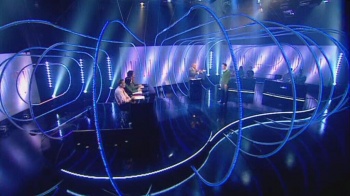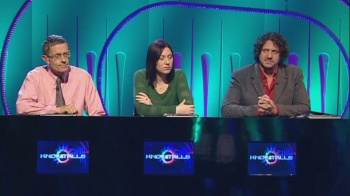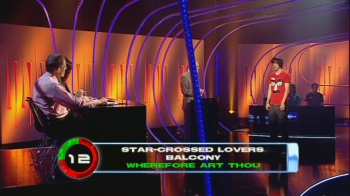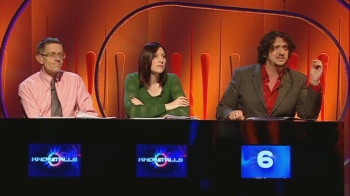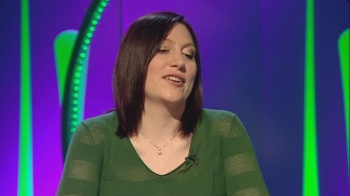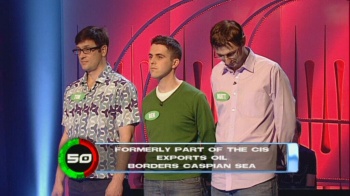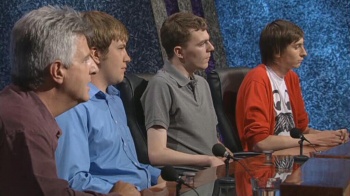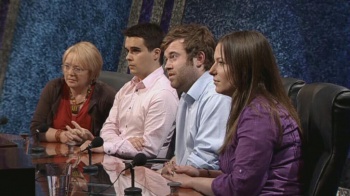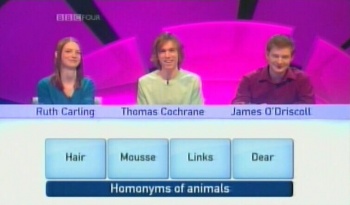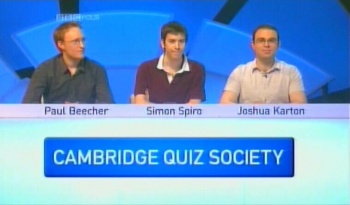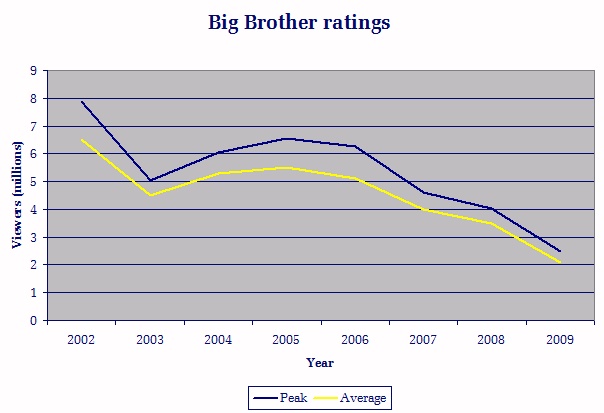Weaver's Week 2009-08-16
m (1 revision) |
UKGameshows (Talk | contribs) |
||
| Line 10: | Line 10: | ||
||<div class=image> | ||<div class=image> | ||
| - | + | [[Image:Knowitalls_set.jpg|350px|Knowitalls]] | |
''The brain now arriving at platform 1...'' | ''The brain now arriving at platform 1...'' | ||
</div> | </div> | ||
| Line 19: | Line 19: | ||
||<div class=image> | ||<div class=image> | ||
| - | + | [[Image:Knowitalls_experts.jpg|350px|Knowitalls]] | |
''(l-r) Simon Calder, Natalie Haynes, Jay Rayner.'' | ''(l-r) Simon Calder, Natalie Haynes, Jay Rayner.'' | ||
</div> | </div> | ||
| Line 28: | Line 28: | ||
||<div class=image> | ||<div class=image> | ||
| - | + | [[Image:Knowitalls_key_facts.jpg|350px|Knowitalls]] | |
''The "key facts" for a contestant to mention.'' | ''The "key facts" for a contestant to mention.'' | ||
</div> | </div> | ||
| Line 37: | Line 37: | ||
||<div class=image> | ||<div class=image> | ||
| - | + | [[Image:Knowitalls_panel.jpg|350px|Knowitalls]] | |
''Jay Rayner misquotes [[Thank Your Lucky Stars|Janice Nicholls]], there.'' | ''Jay Rayner misquotes [[Thank Your Lucky Stars|Janice Nicholls]], there.'' | ||
</div> | </div> | ||
| Line 46: | Line 46: | ||
||<div class=image> | ||<div class=image> | ||
| - | + | [[Image:Knowitalls_Natalie_Haynes.jpg|350px|Knowitalls]] | |
''We told you the set changed colour remarkably often.'' | ''We told you the set changed colour remarkably often.'' | ||
</div> | </div> | ||
| Line 57: | Line 57: | ||
||<div class=image> | ||<div class=image> | ||
| - | + | [[Image:Knowitalls_kazakhstan.jpg|350px|Knowitalls]] | |
''Another change of colour for the final round (subject: Kazakhstan)'' | ''Another change of colour for the final round (subject: Kazakhstan)'' | ||
</div> | </div> | ||
| Line 75: | Line 75: | ||
||<div class=image> | ||<div class=image> | ||
| - | + | [[Image:University_Challenge_2010_Edinburgh.jpg|350px|University Challenge]] | |
''Edinburgh: Alan Kimmitt, Andrew Matheson, Hugh Brechin, Max King'' | ''Edinburgh: Alan Kimmitt, Andrew Matheson, Hugh Brechin, Max King'' | ||
</div> | </div> | ||
| Line 89: | Line 89: | ||
||<div class=image> | ||<div class=image> | ||
| - | + | [[Image:University_Challenge_2010_UCLAN.jpg|350px|University Challenge]] | |
''UCLAN: Maureen McElroy, Duncan Cooper, David Martin, Lisa Atkinson'' | ''UCLAN: Maureen McElroy, Duncan Cooper, David Martin, Lisa Atkinson'' | ||
</div> | </div> | ||
| Line 121: | Line 121: | ||
||<div class=image> | ||<div class=image> | ||
| - | + | [[Image:Only_Connect_homonyms_animals.jpg|350px|Only Connect (2)]] | |
''The Mathematicians with a question that had us saying, oh dear.'' | ''The Mathematicians with a question that had us saying, oh dear.'' | ||
</div> | </div> | ||
| Line 136: | Line 136: | ||
||<div class=image> | ||<div class=image> | ||
| - | + | [[Image:Only_Connect_Camb_Quiz_sf.jpg|350px|Only Connect (2)]] | |
''Heading to the final: the Cambridge Quiz Society.'' | ''Heading to the final: the Cambridge Quiz Society.'' | ||
</div> | </div> | ||
| Line 156: | Line 156: | ||
So long as ''Big Brother'' attracted audiences sufficiently attractive for it to turn a profit, it could be excused its place in the schedules. If an episode of ''Big Brother'' contributed £68,000 to Channel 4's profits, that's an additional £68,000 the channel can spend on other programmes. It'll pay for an edition of Channel 4 News, or two hours of arts programming, or 1% of the channel's expenditure on other game shows. With the reduced viewing figures and increased cost, it's a little difficult to see how ''Big Brother'' is paying its way. The show is such a monolith – it occupies over 240 hours on Channel 4, and something like 1200 hours on E4 – that it surely must squeeze out more promising shows. | So long as ''Big Brother'' attracted audiences sufficiently attractive for it to turn a profit, it could be excused its place in the schedules. If an episode of ''Big Brother'' contributed £68,000 to Channel 4's profits, that's an additional £68,000 the channel can spend on other programmes. It'll pay for an edition of Channel 4 News, or two hours of arts programming, or 1% of the channel's expenditure on other game shows. With the reduced viewing figures and increased cost, it's a little difficult to see how ''Big Brother'' is paying its way. The show is such a monolith – it occupies over 240 hours on Channel 4, and something like 1200 hours on E4 – that it surely must squeeze out more promising shows. | ||
| - | <div class= | + | <div class=square> |
[[Image:Square Big Brother.jpg]] | [[Image:Square Big Brother.jpg]] | ||
</div> | </div> | ||
Revision as of 14:00, 22 December 2009
Last week | Weaver's Week Index | Next week
Contents |
Knowitalls
BBC2, 6.30 weekdays
| "There's no such thing as useless information!" promises Gyles Brandreth, the host of this tea-time exercise in trivia. In that spirit, we should make two points: thanks to the BBC's late acquisition of a Scotland football match, the first semi-final went out at that well-known tea-time time of 2.30pm; and that Mr. Brandreth managed to present one show while simultaneously competing against Paul Merton on Just a Minute. The man clearly doesn't respect the usual laws of time and physics, and we wonder why he's never been invited to play the lead role in Dr Who.
But we digress. The game is to be played on the most remarkable set we've seen since Eurovision. It's as if someone had taken a curve in a railway tunnel, stripped away the concrete walls but retained the support struts, and then decorated those struts with little multi-coloured fairy lights. When seen from afar, the effect is mesmerising: when shot from inside the arena, the decorations tend to distract. The set changes colour with each round, going through almost all the colours of the rainbow – there are blues, purples, and oranges, but also greens, turquoises, and reds. Have they based the colour scheme on Gyles's famous jumpers? | |
| Anyway, the game is 50% larger than Noah's Ark, it's played three by three by three versus three. There are three rounds, three experts, and a team of three contestants playing another team of three contestants. The teams are made up of friends, work colleagues, and such. For reasons best-known to the producers, the teams are referred to as objects of their captain – "Gavin's Team", "Stacey's Team", that sort of thing. We're not entirely sure if this is better than Battle of the Brains's habit of letting teams pick outlandish names, or inferior to Blast Lab's refrain of "No, you're the red team, and that's that!"
We also mentioned three experts, people who are specialists in a particular field. The pictures in this review come from episode seven, when the experts were Simon Calder (travel), Natalie Haynes (art and literature), and Jay Rayner (food and drink). Other experts have been on entertainment, science, politics and business, history. There's no polymath, no expert on pot pourri, which we think is a bit of a missed opportunity. | |
| An hour before round one, the experts were revealed to the teams, and they were given the three subjects on which they'd be asked to talk. During this hour, the teams are locked in a room and allowed to compare notes, rack their brains, discuss around the topics. It's never made clear whether the teams were told the general area for their talk (for instance, Art and Literature) or the specific area (for instance, "Romeo and Juliet"). We assume that the latter is the case, as otherwise the subjects are too broad for anyone to swot up on. One by one, the contestants come up, and deliver 45-second lectures on their assigned topics.
The scoring in this round is simple: one point for a verifiable fact, two points for something that really impresses the judge. Each subject will have three "key facts" selected – these tend to be fairly obvious things about the subject, nothing requiring tremendous depth of knowledge. To return to "Romeo and Juliet", the selected "key facts" were star-crossed-lovers; balcony; and "wherefore art thou". The usual point is given for naming one of these "key facts"; if all three are mentioned in the lecture, a two-point bonus is awarded. | |
| Inevitably, the scoring from judge-to-judge is a bit subjective, but each person seems to mark to the same standard, and all judges to roughly the same yardstick. It's clear that they've been asked to mark fairly harshly, assertions that "Rafael Nadal won lots of tennis matches in 2008" wins nothing. By contrast, "Nadal won the French Open and Wimbledon in 2008" is worth a point, and "Nadal went 78-10 in singles play during 2008" gets (at least) two. However, if the contestant is in any way inaccurate, the claim is discarded. There's no penalty to the score, but neither is there a mark for partial credit.
After everyone's gone up, half of the show has elapsed. A good and lucky team will have scored 30 points, a poorer team perhaps 15. Round two is the only time that the two teams go head-to-head: in turn, each of the experts gives a subject, and Gyles allows "a few minutes" for the teams to confer. One of them steps before the expert, and they're given seven seconds to deliver one fact. The expert then adjudicates on the factual nature (or otherwise) of the offered wisdom, and awards five points to the fact they believe better. We're not sure why the seven-second time limit is imposed, just asking for one fact without going against the clock would lead to less dead air. |
|
| We mentioned that the experts had to adjudicate on whether the "facts" offered were actually facts. They do this by consulting reference sources, checking their working and making sure they're right before passing judgement. We understand that the contestants' lectures in round one are recorded in a block in the afternoon, then the experts take an hour or two to prepare their responses and deliver them during an evening filming session. Such breaks aren't possible in round two: the contestants deliver their pieces, the judge retires to check their facts, and then returns after a few minutes to deliver their piece. It's staccato television, and it does show a bit.
In the worst case, a team could be 30 points ahead going into the final round; in the best case, the difference could be only a couple of marks. Whichever team leads plays round three first. Here, all three players take to the stage, and stand before their respective judge. In turn, the expert will call out a subject, and the player must deliver a lecture on that topic. As in round 1, the expert has picked out three "key facts"; as soon as the player hits any one of those, the expert will call out, award five points, and play moves to the next player and the next judge. Should the contestant become stuck for ideas, they can pass and move on. Repeat this for 90 seconds for a fast and furious finale, with points flying about all over the place – scores of 40 points are not uncommon. And, of course, whichever team has the more points at the end of the show wins, and progresses in the 16-team knockout tournament. | |
| By rights, we should love this show. In truth, we don't. The selection of "key facts" tends to the arbitrary – why is it a "key fact" that the Rhine flows through Germany and not that it flows past Strasbourg? The last round reminds us of ITV's daytime filler Talkabout, only with Andrew O'Connor replaced by Gyles Brandreth, and that strikes us as a trade down. (Though we never catch Mr. O'Connor in two places at once...) Earlier in the show, the adjudication feels a bit squiffy – we've noticed occasions when the experts have given a definitive ruling on a matter of great scholarly debate without revealing this uncertainty to the viewer. Real scholarship is not always black and white, there aren't always winners and losers – for instance, Nadal's 78 wins last year include three in the Davis Cup – some argue that these shouldn't be included in a singles tournament record.
Perhaps the biggest obstacle to us liking the show is the set. It's a design that viewers either love or hate, and even though we love a good orange-and-purple design (it's very 1997), we often found ourselves recoiling from the screen and losing the thread of the show. The host is almost invisible – Gyles could be replaced by a friendly robot with slightly dodgy dress sense and the show would be scarcely different. We applaud shows that revel in the accumulation of useless knowledge. Goodness knows, we spread enough useless knowledge ourselves. Knowitalls is a decent enough format, and with a few tweaks and changes, could yet turn into an outstanding programme. It's not quite there yet, but we live in hope. |
The RBQ-style question: "The creator of Cacofonix and Anticlimax, the priest for a lampyrida, an entry in an open-high-low-close chart. Will these drive out James Stewart and Kim Novak?" Answer later.
University Challenge
Heat 6: Edinburgh v Central Lancashire
| Thumper begins the show by quoting from JF Roxborough, that students should be excellent in a dance, and invaluable in a shipwreck. The rules are unchanged, so Thumper runs through them all. Just in case we'd forgotten. Rebellion of the week is "Glorious Revolution", and it goes to Edinburgh. The university established in 1582, and was recently criticised by Margaret Mountford, who said that the university wasn't as good as it used to be. Perhaps she was thinking of her friend's friend, Gordon Brown, who collected a doctorate from the university.
Number of the week is 6, not that either side gets it; nor do they get geekery of the weekery Marshall McLuhan. The University of Central Lancashire (referred on screen as UCLAN) was founded in the 1820s, was known in the 1970s as Preston Polytechnic, and the 1980s as Lancashire Polytechnic. Yes, it's the year's Token Former Polytechnic, allowed to enter purely so that the producers can tick the box saying that they don't discriminate against the "new" universities. Most of the "new" universities have been universities since before their current undergraduate class started school. We're getting old. The first visual round is that old quiz standby, Name The Year. Unlike some other programmes we've reviewed recently, this isn't asking the teams to remember last Thursday afternoon, but to identify football seasons from the top four and bottom four in the English top division football table. Edinburgh make a remarkably good fist of this, and take the lead, 50-45. | |
| Edinburgh promptly recall the well-known deceased avian the Norwegian Blue, and UCLAN do rather well on the guesses, dredging "Diogenes Syndrome" from a guess that he lived his life in a barrel. The audio round asks for knowledge of jazz vocalists, and UCLAN has moved back into the lead, 95-70.
How many islands are there off the north coast of Devon? There's something other than Lundy? We learn something new every day. Edinburgh closes the gap with knowledge of political resignations, and ahead with knowledge of the axes of an ellipse. It also ensures that all the team members have answered at least one starter. Just when UCLAN look like they're dropping behind, this happens:
They then get a hideously long set of bonuses on homophones, and have to spell our pallet, pallete, and palate. It takes forever. Do the sides not watch Blue Peter? Did they not recall Mark Curry getting freezing in the Serpentine on Christmas Day? The second visual round is dropped by both sides, and it's 120-all. | |
| That second visual round is on trade union leaders, and the only one they know is Bob Crowe. The denizens of Daily Mail Island can go to sleep, this show is far above their mental capacity. Not least because both sides are within ten points of a place on the repechage board. Edinburgh take their place from bonuses on the cricket World Cup, and do better with films about menages a trois, but need a couple more starters to be assured of the win. UCLAN get their starter, and the first bonus pushes Nottingham out of the repechage place. At the gong, Edinburgh has won, 170-155.
It was a slow-scoring affair, just eighteen starters answered correctly in the entire show, and somewhat more conferring than in the past couple of weeks. Hugh Brechin captained his side to success in this match, he got five sides as his side made 16/27 bonuses. For UCLAN, Duncan Cooper's five starters were best, the side made 13/27 bonuses. Next match: (24 August) King's College London v Cardiff | Repechage standings:
|
Only Connect
Series 2, Episode 5: Mathematicians v Cambridge Quiz Society
| "First you must know things, then you must be able to connect them", says our host. This week's teams are relentlessly young, all seem to have been out of university for about two minutes.
This is the semi-final, so we're expecting things to be a little more difficult. Maths begins with the audio round, and are gambling already: months is a trap from the first two clues, the link is dreams. Cambridge pick the picture round, and get bogged down discussing characters from the musical Chicago. Maths do at least guess something, but it's completely wrong. What is this Top Gear of which they speaketh? Their next question goes for a bonus, and Cambridge spot it's feet on furniture. Lord Kelvin of Largs to George Orwell via the Ebola virus and India? Not name changes, but all names derived from rivers. Maths spot that the next question is some sort of wordplay, the exact sort evades both sides: they're all homonyms for animals. Nasty. Welcome to the semi-finals. The last question is on mathematics, and the answer is that they would all cause an error on a standard calculator going up to 10 to the power of 100 – 70! is the key. The regulars at Bother's Bar were not impressed by this question. At the end of the round, Cambridge leads 1-0. Maths get the link for the first connection for three points, but need a bit of reassurance to remember what comes fourth: it's Canadian provincial capitals from west (Victoria, BC) to east (so Winnipeg, Manitoba). Cambridge promptly gets three on the Marxist arrangement of society, from aristocrats to the proletariat. Billy Joel's song "We didn't start the fire" provides the next four: Harry Truman, Doris Day, Red China, Johnny Ray. Or, as the Mathematicians suggest, Harry Truman, an actress we don't know but isn't Marilyn Monroe... | |
| Countries beginning with A-B-C-D is obvious, but it's the ones represented by A-B-C-D on the back of the car, so it's got to end with Germany. Deutschland. Maths get a numbers question: eight, eight billion, eight billion and eight, but it's whole numbers in alphabetical order: they're looking for eight billion and eighteen. The Milliard Defence League is muttering "000h" under its breath, but we must move on, there are walls in sight. After going from alpha to zeta in the first round, the teams have gone from zeta to alpha here, so Cambridge end with full moons. Which drive them all to lunacy, because they don't see the moons. Cambridge lead 4-2.
On to the walls, and Cambridge pick up their first group while we're still trying to work out what the heck the grid's about. Their second group is sorts of shot in golf, it takes a fair few goes to resolve the set. We're as stumped as they are for the final groups. First group turns out to be letters in the Hebrew alphabet, and Victoria gives the clue (not that they needed it) of not saying them out. Synonyms for "tease" and words that end in boys' names evade the side, for four points. The Mathematicians didn't do well on their grid last time, and characters from "Alice in Wonderland" is too obvious. Types of soup are their first set, and a good guess to work out there's a Buffalo Springs helps to resolve the second set. "Shrub is an anagram of brush", suggest the team, more accurately than their suggestion from the last round that Kojak is a palindrome. We're not going to let them live that down! Indeed, one of the groups is that they're anagrams of other clues, but the final group evades them – it's "As mad as a ___". Seven points means Maths leads by 9-8. It's all become very tight! Mssng Vls begins with a set of fashion designers, which Cambridge wins 3-0. Proverbs about relationships ends 2-1 to Cambridge, after a harsh (but fair) deduction to Maths. They get one on chemistry equipment, but the Cambridge side has won, 13-11. Maths will be as mad as anything, that dropped link on the wall cost them victory. For want of a nail – oh, that was last series. Next match: Rugby Boys v Chessmen |
This Week And Next
Cacofonix and Anticlimax are names in the Asterix albums, created by Anthea Bell from the original French characters Assurancetourix and Jolitorax. A lampyrida is more commonly known as a firefly, and the priest character on the short-lived "Firefly" television series was Derrial Brook. For stock market people, a chart showing daily opening, high, low, and closing prices is a Candlestick chart, an individual entry is known as a candle. "Bell Book and Candle" was a 1958 movie starring Stewart and Novak, and the items are used in some religious exorcism rituals.
We note that the new series of Strictly Come Dancing has abolished the Sunday night results show, keeping the series entirely on Saturday nights. ITV's miserable alternative, Simon Cowell Annoys, may well go in the opposite direction and put its results out on Sunday.
Last week, this column muttered how Charlie Brooker wasn't criticising Endemol productions. This week, his show spent ten minutes ripping Deal or No Deal to shreds. We disagree with the panel: there is some skill involved in the game, but it's displayed by the producer on the other end of the telephone, in pitching their offer for the result they want. And how come only viewers in Nigeria get John Fashanu while we get someone who makes Jeremy Guscott look good. They also discussed Dragons' Den, and laid into Peter Jones (3).
Big Brother seemed to move closer to death this week. Following blatant and repeated breaches of the rules by most of the contestants, the producers allowed them to openly discuss their nominations. Big Brother has been in decline for a few years now, and we've got a graph to prove it. Viewing figures for the first two series aren't comparable with later years, but averaging the first week in July shows a decline from 6.5m average (7.9m peak) in 2002, then four years around 5m before falling to 4m, 3.5m, and just 2.1m this year.
So long as Big Brother attracted audiences sufficiently attractive for it to turn a profit, it could be excused its place in the schedules. If an episode of Big Brother contributed £68,000 to Channel 4's profits, that's an additional £68,000 the channel can spend on other programmes. It'll pay for an edition of Channel 4 News, or two hours of arts programming, or 1% of the channel's expenditure on other game shows. With the reduced viewing figures and increased cost, it's a little difficult to see how Big Brother is paying its way. The show is such a monolith – it occupies over 240 hours on Channel 4, and something like 1200 hours on E4 – that it surely must squeeze out more promising shows.
On the other hand, we can see that the Channel 4 show – still attracting 2 million viewers, almost entirely young, almost entirely aspirational – remains attractive to advertisers, and generates more income than other commissions might. Much of the other output, lest we forget, goes out overnight or in E4 daytime, which have never been the home of high-budget new programming. As ever, there are arguments on both sides, and it may not be time to close the eye quite yet.
The ratings for the week to 2 April, and Total Wipeout (4.75m) leads from Millionaire (4.15m) and Guesstimation (4m). Dragons' Den had 3.35m, Big Brother 2.75m, and University Challenge 2.65m. A repeat of Buzzcocks was seen by 2m; thank you, Frankie. Put Your Money Where Your Mouth Is also had its best score of the year, 1.5m. Digital channels had Come Dine With Me (950,000), Big Brother's Big Mouth's best result yet (635,000), and Mock the Week on Dave recorded its best score of the year (530,000) beating QI by four thousand viewers. Britain's Got Talent Us interested just 445,000, and Best of Friends 205,000.
Coming up this week, BBC3 has Virgin Cooks (8pm Tuesday), Radio 4 says I Guess That's Why They Call It the News (6.30 Friday), and Challenge wonders how to play Chain Letters (3pm weekdays). ITV is gearing up for that annual ritual known as Simon Cowell Annoys (Saturday from 7pm), but follows it with Phillip Schofield's return to Saturdays on The Cube (8.30). The next two Weeks will contain the third in our occasional series of photo-essays on The Adventure Game, now up to series 3.
To have Weaver's Week emailed to you on publication day, receive our exclusive TV roundup of the game shows in the week ahead, and chat to other ukgameshows.com readers sign up to our Yahoo! Group.

